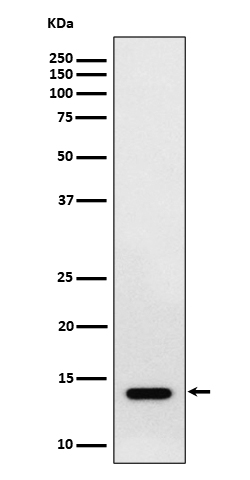Anti-RNF7 Rabbit Monoclonal Antibody
- SPECIFICATION
- CITATIONS
- PROTOCOLS
- BACKGROUND

Application
| WB, IHC, IF, ICC |
|---|---|
| Primary Accession | Q9UBF6 |
| Host | Rabbit |
| Isotype | IgG |
| Reactivity | Rat, Human, Mouse |
| Clonality | Monoclonal |
| Format | Liquid |
| Description | Anti-RNF7 Rabbit Monoclonal Antibody . Tested in WB, IHC, ICC/IF applications. This antibody reacts with Human, Mouse, Rat. |
| Gene ID | 9616 |
|---|---|
| Other Names | RING-box protein 2, Rbx2, CKII beta-binding protein 1, CKBBP1, RING finger protein 7, Regulator of cullins 2, Sensitive to apoptosis gene protein, RNF7, RBX2, ROC2, SAG |
| Calculated MW | 13 kDa |
| Application Details | WB 1:500-1:2000 IHC 1:50-1:200 ICC/IF 1:50-1:200 |
| Contents | Rabbit IgG in phosphate buffered saline, pH 7.4, 150mM NaCl, 0.02% sodium azide and 50% glycerol, 0.4-0.5mg/ml BSA. |
| Clone Names | Clone: 30R91 |
| Immunogen | A synthesized peptide derived from human RNF7 |
| Purification | Affinity-chromatography |
| Storage | Store at -20°C for one year. For short term storage and frequent use, store at 4°C for up to one month. Avoid repeated freeze-thaw cycles. |
| Name | RNF7 (HGNC:10070) |
|---|---|
| Function | Catalytic component of multiple cullin-5-RING E3 ubiquitin- protein ligase complexes (ECS complexes), which mediate the ubiquitination and subsequent proteasomal degradation of target proteins (PubMed:21980433, PubMed:33268465, PubMed:38418882, PubMed:38574733). It is thereby involved in various biological processes, such as cell cycle progression, signal transduction and transcription (PubMed:21980433, PubMed:33268465, PubMed:38418882, PubMed:38574733). The functional specificity of the E3 ubiquitin- protein ligase ECS complexes depend on the variable SOCS box-containing substrate recognition component (PubMed:21980433, PubMed:33268465). Within ECS complexes, RNF7/RBX2 recruits the E2 ubiquitination enzyme to the complex via its RING-type and brings it into close proximity to the substrate (PubMed:34518685). Catalytic subunit of various SOCS- containing ECS complexes, such as the ECS(SOCS7) complex, that regulate reelin signaling by mediating ubiquitination and degradation of DAB1 (By similarity). The ECS(SOCS2) complex mediates the ubiquitination and subsequent proteasomal degradation of phosphorylated EPOR and GHR (PubMed:21980433, PubMed:25505247). Promotes ubiquitination and degradation of NF1, thereby regulating Ras protein signal transduction (By similarity). As part of the ECS(ASB9) complex, catalyzes ubiquitination and degradation of CKB (PubMed:33268465). The ECS(SPSB3) complex catalyzes ubiquitination of nuclear CGAS (PubMed:38418882). As part of some ECS complex, catalyzes 'Lys-11'-linked ubiquitination and degradation of BTRC (PubMed:27910872). ECS complexes and ARIH2 collaborate in tandem to mediate ubiquitination of target proteins; ARIH2 mediating addition of the first ubiquitin on CRLs targets (PubMed:34518685, PubMed:38418882). Specifically catalyzes the neddylation of CUL5 via its interaction with UBE2F (PubMed:19250909). Does not catalyze neddylation of other cullins (CUL1, CUL2, CUL3, CUL4A or CUL4B) (PubMed:19250909). May play a role in protecting cells from apoptosis induced by redox agents (PubMed:10082581). |
| Cellular Location | Cytoplasm. Nucleus |
| Tissue Location | Expressed in heart, liver, skeletal muscle and pancreas. At very low levels expressed in brain, placenta and lung |

Thousands of laboratories across the world have published research that depended on the performance of antibodies from Abcepta to advance their research. Check out links to articles that cite our products in major peer-reviewed journals, organized by research category.
info@abcepta.com, and receive a free "I Love Antibodies" mug.
Provided below are standard protocols that you may find useful for product applications.
If you have used an Abcepta product and would like to share how it has performed, please click on the "Submit Review" button and provide the requested information. Our staff will examine and post your review and contact you if needed.
If you have any additional inquiries please email technical services at tech@abcepta.com.













 Foundational characteristics of cancer include proliferation, angiogenesis, migration, evasion of apoptosis, and cellular immortality. Find key markers for these cellular processes and antibodies to detect them.
Foundational characteristics of cancer include proliferation, angiogenesis, migration, evasion of apoptosis, and cellular immortality. Find key markers for these cellular processes and antibodies to detect them. The SUMOplot™ Analysis Program predicts and scores sumoylation sites in your protein. SUMOylation is a post-translational modification involved in various cellular processes, such as nuclear-cytosolic transport, transcriptional regulation, apoptosis, protein stability, response to stress, and progression through the cell cycle.
The SUMOplot™ Analysis Program predicts and scores sumoylation sites in your protein. SUMOylation is a post-translational modification involved in various cellular processes, such as nuclear-cytosolic transport, transcriptional regulation, apoptosis, protein stability, response to stress, and progression through the cell cycle. The Autophagy Receptor Motif Plotter predicts and scores autophagy receptor binding sites in your protein. Identifying proteins connected to this pathway is critical to understanding the role of autophagy in physiological as well as pathological processes such as development, differentiation, neurodegenerative diseases, stress, infection, and cancer.
The Autophagy Receptor Motif Plotter predicts and scores autophagy receptor binding sites in your protein. Identifying proteins connected to this pathway is critical to understanding the role of autophagy in physiological as well as pathological processes such as development, differentiation, neurodegenerative diseases, stress, infection, and cancer.


